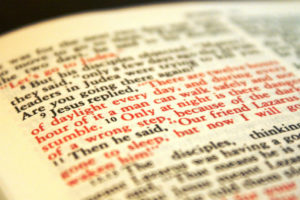I am one of those people who love to discuss books in the process of reading them. I just can’t help it. In English class, I’ve made my friends discuss the reading from the night before with me—which usually entailed predicting the rest of the book, discussing favorite (and least favorite) characters, and reciting favorite parts—every morning, before class, on queue. This being the case, I have a tendency to ask new people I meet about their favorite books, and share what I am currently reading. Classic literature is my favorite, and I am always so shocked when I find people who claim to “hate old books.” This deeply saddens me, especially since I think reading is such a gift.
What I feel many Christians fail to realize is the privilege and duty of reading. We primarily communicate with God through studying and receiving His Word, i.e. reading. Through diligent cultivation of Scripture, we develop an intimate love relationship with Him that magnifies who He is and who we are as we stand before Him. This relationship cannot be brought to its fullest without reading, as we speak to Him through prayer, and He to us through His Word.
Further, the art of reading came into existence out of the necessity for all people to understand the Bible. As I hope many remember from History class, reading the Scripture was considered elite, and preserved for those within the priesthood of the church. The Reformation—remember Martin Luther and his ninety-five theses?—helped to spark this centralization of reading. The Gutenberg Press helped promote this idea, which made it possible not only to print the Bible, but several other works, which served as a means of educating commoners out of poverty. It enabled people to take action in their governments, and so on as the history lesson goes.
As a result, reading trains each individual to tap into thinking, reflecting, and the harvesting of truth: otherwise known as critical reading. Mortimer J. Adler, in his book How to Read a Book, says of the art:
Discipline, as I have said before, is a source of freedom. Only a trained intelligence can think freely… It is not just a play on words to connect liberalism and liberal education, or to say that training in the liberal arts liberalizes—makes us free. The arts of reading and writing, listening and speaking, are the arts which make it possible for us to think freely, because they discipline the mind.[1]
The decline in reading is often easily contributed to illiteracy. And, it is a tragedy to reflect on how many communities and countries are without the means to read. But, those who choose not to read are no better off than those who can’t read at all. This dilemma of a-literacy is an ever-rising problem, and is just as damaging. And, I hope it is the Christian who notices this first, and takes action against it.
The Christian is presented with a unique advantage: established truth. They are given insight about life, the world, and all things in between. Gene Edward Veith in his article “Flex the Brain” notes “the worldview the Bible sets forth is comprehensive, whole, and bigger than all of the narrow alternatives conceived by the whole array of fallen human minds.”[2] We are supplied with objective moral truth on all matters. This being said, it is henceforth very important for the Christian to develop his or her worldview since it provides the tools we need to pick apart that which we absorb.
I feel I cannot emphasize how important it is for the Christian to establish their worldview. Without one, it becomes very difficult to consult anything—let alone literary works—objectively for moral and theological evaluation. Not only is it vital for the Christian to develop his own worldview, it is also just as important to understand the worldviews of the authors which he is reading that he may best understand the material itself and prepare a Christian response to it.
In order to be successful in reading as a Christian, there are certain elements one must hold to. For one, we have to read actively: be the one in charge of what is happening, get inside the author’s mind, focus on what he or she is saying, and evaluate their words; do not let the author simply indoctrinate you. Reading actively will allow us not to just understand the content, but to realize its meaning and its affect on the reader. I see people shy away from some books (e.g. Dracula or the Harry Potter series) because of moral reasons. But, just because a book contains, let’s say, adultery, for instance, does not make it an immoral book. The Scarlet Letter serves as a beautiful of illustration of this. Reading it passively, it may become easy to suck into the idea of a scandalous love story (I have seen it happen), but that is not the true essence of the story. In actuality, it teaches the effects of sin openly and privately. Hester Prynne’s shameless showing of her scarlet A makes the townspeople numb to sin, while Reverend Dimmesdale (who conceals his part) is eaten alive by his constant dwelling on and guilt for his sin.
Another thing I notice Christians don’t take advantage of is that our worldview gives us the big picture. This does not bind us to reading only Christian works, but to a wide range of literature. We are given the opportunity to tune into a vast array of insights, from Christian and non-Christian writers. For example, writers like Henry David Thoreau or Walt Whitman have a naturalistic and transcendentalist worldview. They taught that divinity pervaded all nature and humanity and that nothing existed beyond the universe (but, if it did, it did not affect us here). Man and nature coexisted together and work together for harmony. It held the idea that “everything is God.” For many reasons, Christians reject these philosophies. Knowing their worldviews helps us find the flaws in their works. But, on the other side of the spectrum, we can acknowledge what they say about the beauty of nature. We can agree that, yes, trees and rivers and mountains are lovely, and that man can do great things—but, we worship our Creator for it, instead of the creation itself.
Overall, I find there is a need for Christians to delve deeper into the realm of literature. Do not mistake me for saying that reading theological works is wrong. Christians should expose themselves to various ranges of literature though—theology, poetry, fiction, biography, historical, and so on. It would be ignorant to confine oneself to only one genre and ignore all that is available to us. We have reason to keep reading alive. Cultures must always have leaders and thinkers. As Veith concludes in his article on the subject, “Christians must always be people of the Book”[3]
[1] Adler, M. J. (2002). How to Read a Book (pp. 363-366).
[2] Veith, G. E. (2003, November 1). Flex the Brain. WORLD, 18(42).
[3] ibid.
———————————————————–
 Diamond is a senior at Lake Mead Christian Academy in Las Vegas, Nevada. When she’s not in school, most of her time is spent checking books off of an endless list of “To Read”, writing realistic fiction, playing with design in Illustrator, and blogging to her little heart’s content. In February of 2012, she won four awards for writing in the Scholastic Art & Writing Awards for the Alliance of Young Artists and Writers and was in the running for a show casing in Carnegie Hall. She hopes to pursue her dream of writing pieces of literature that stand the test of time by attending Wheaton College in Wheaton, IL and majoring in English.
Diamond is a senior at Lake Mead Christian Academy in Las Vegas, Nevada. When she’s not in school, most of her time is spent checking books off of an endless list of “To Read”, writing realistic fiction, playing with design in Illustrator, and blogging to her little heart’s content. In February of 2012, she won four awards for writing in the Scholastic Art & Writing Awards for the Alliance of Young Artists and Writers and was in the running for a show casing in Carnegie Hall. She hopes to pursue her dream of writing pieces of literature that stand the test of time by attending Wheaton College in Wheaton, IL and majoring in English.





5 Comments
Leave your reply.